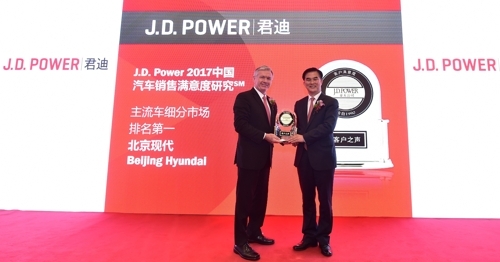South Korean carmaker Hyundai Motor said Monday it took the top spot in J.D. Power's customer satisfaction survey in China this year despite declining sales in the wake of a diplomatic row between the two countries.
In 2017, Hyundai Motor took the No. 1 position back in China after losing it to Dongfeng Peugeot-Citroen Automobile, a joint venture between Dongfeng Motor Corp and PSA Peugeot Citroen, last year in J.D. Power's Sales Satisfaction Index, the company said in a statement.
 |
In this photo taken in an event held in Beijing on June 29, 2017, and provided by Hyundai Motor, Finbarr O'Neill (L), president of J.D. Power and Associates, and Kwon Hyuk-dong, senior vice president of Hyundai Motor's operations in Chinapose for a photo after the carmaker was awarded for its J.D. Power's satisfaction rankings in China. (Yonhap) |
In the January-May period, Hyundai saw its sales plunge 37 percent to 266,228 vehicles in the world's biggest auto market from 425,561 units a year earlier.
Sales at its sister company Kia Motors Corp. also suffered a sharp decline affected by an escalated row between Seoul and Beijing over the deployment of an advanced US anti-missile defense system in South Korea.
Kia's sales fell 54 percent on-year to 110,667 autos in China in the first five months from 240,588 units a year earlier.
China has take measures against travel packages to South Korea and its products as part of its retaliation against the installation of the Terminal High Altitude Area Defense system.
Seoul and Washington have argued THAAD is purely aimed at countering missile threats from North Korea. But Beijing has opposed the system, arguing it could be used against it. (Yonhap)






![[Today’s K-pop] Blackpink’s Jennie, Lisa invited to Coachella as solo acts](http://res.heraldm.com/phpwas/restmb_idxmake.php?idx=644&simg=/content/image/2024/11/21/20241121050099_0.jpg)
